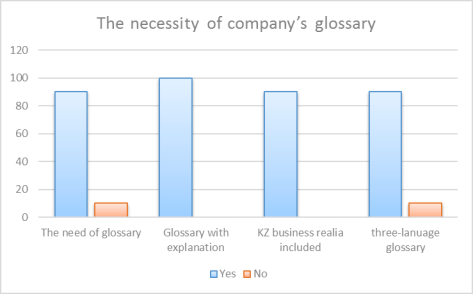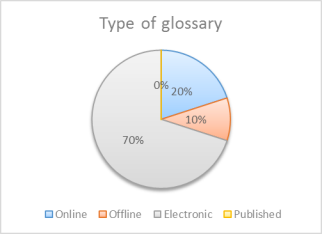The development of a glossary for the financial sector of Kazakhstan is caused by the need for its practical application in the production process, in particular, in financial companies of Kazakhstan to simplify the work and streamlining of work processes. This article is describing survey which was aimed at selecting samples and words that are often used in financial companies, namely PwC Kazakhstan; systematizing and classifying them in accordance with their attitude towards the department; trying to classify concepts with equivalents not only in English and Russian, but also in Kazakh. The purpose of the survey is to identify frequency of glossary usage by PwC employees and the need of company’s own glossary.
Key words: glossary, survey.
Incorrect translation may lead to big problems in the financial world. Proficient translator should get the terminology right as well as understand the target market. One of the most common translation problems faced by linguists is getting the terminology right. While translating in financial sector, it is extremely important to have a deep understanding of what you do, what is the area of translation. Terminology in this industry is crucial and unique so it can be a serious challenge for those who have no experience, for new joiners of any financial enterprise, for those who can be a professional in the industry but suffer from lack of English. There are few industries more global than the finance sector across the world. We just need to look at the way the UK’s Brexit vote, and the subsequent fall in the pound that came with this in late June, and how this had a knock on effect on the rest of the globe’s financial sectors and currencies to see this is the case. However, one issue that can come up with the cross-border nature of the finance sector rears its head in the translation of documents. Deals are often done cross border, and finance information documents being sent across the world, even within the same company, need to be translated into a range of target languages to ensure that everyone knows what they need to know to get the job done. One of the biggest financial enterprises of Kazakhstan is the branch of PwC. PricewaterhouseCoopers (doing business as PwC) is a multinational professional services network headquartered in London, United Kingdom. Service lines: Assurance (43 %), Advisory (32 %), Tax (25 %). It is the second largest professional services firm in the world, and is one of the Big Four auditors, along with Deloitte, EY and KPMG. The financial world of PwC, like the majority of enterprises in Kazakhstan and all over the world, is extremely fast-paced and time-restricted. Reports, statements and important updates are published after each signing off and there are tight deadlines that companies would not dare to miss. Financial translations therefore need to be carried out in a timely manner. All associated teams and partners need to be on point and prepared to publish at any moment in time and this includes the translators, too. Many of reports are translated by employees of PwC themselves who are audit, tax and legal or advisory consultants by major without degree in translation studies. It becomes more challenging when the volume of work is high and this is usually often the case in the economic world. That is why there is a reasonable question arises: what if to create a glossary which would help employees to avoid consuming of time and lighten their work? Besides, one common glossary of terms will help to align all the terms and make all key terms of different financial documents to be the same.
The first stage to find out the solution need of such glossaries is to conduct a survey within the company. The purpose of the survey is to identify frequency of glossary usage by PwC employees and the need of company’s own glossary. In accordance with the purpose of this survey thefollowing major tasks of the survey include: to find out possible difficulties connected with translation employees could meet in their work, to identify type of glossaries which would be appropriate and easy-to-use, to spot the need of three-language glossary (Rus-Eng-Kaz).
Conducted survey was consisted of 13 questions, oriented on achieving the main goal of the survey; number of respondents — 10. Respondents were predominately female (by 90 %) The average age was 27 years. Native language of 60 % respondents is Kazakh, 20 % of respondents pointed English language as native, 10 % — Russian and 10 % preferred to choose other native languages. 70 % of respondents were from IFS (internal firm services), while other departments — Assurance, Advisory and Tax shared 10 % each. The vast majority (70 %) noted that it is difficult to operate with financial terms, which influenced on next question answers which show 80 % of respondents use financial glossaries in their work. Almost half (40 %) of informants contact translator’s department once a month in comparison with other 40 % who responded that contact translators very rarely. 80 % of them say that have neutral attitude to given translation. Used methods are: Survey, Quantitative method, Qualitative method.
According to the survey, practically all respondents (90 %) are interested in company’s own glossary.

Fig. 1. The necessity of company’s glossary
70 % of them prefer if it would be an electronic glossary. All the respondents of the survey showed the tendency to choose glossary with conjunctions, abbreviations and all needed explanations. One more important fact that 90 % of respondents are interested Kazakhstani financial business realis to be included in and they prefer three-language glossary. It is worth noting that respondents were proactive in adding comments that shows their positive attitude towards the survey in general and implementation of potential glossary in the future.

Fig. 2. Type of glossary
Finance is a very tricky sector to deal with, particularly when it comes to translation. Speed is a vital part of the industry, with translations needing to be carried out quickly to ensure that deals can be completed and markets understood in a very global sector. However, this does not mean that quality can be overlooked, especially when it comes to such a volatile and finely balanced sector as finance, where one misunderstanding can lead to drastic problems. A skilled translator in the financial sector needs not only a strong knowledge of the languages involved, but also needs to be au fait with the nuances and technicalities that exist to be able to provide a flawless translation that allows for seamless operations across borders. Financial glossary will help employees to facilitated working progress. They will contribute in avoiding consuming time and automate translating processes. Moreover, if glossary is three-language, it will be more useful for lighten work in terms of financial sector of our country.
References:
- https://www.languageconnect.net/blog/finance-and-insurance/common-problems-faced-in-the-translation-of-finance-documentation/
- https://www.pwc.kz/
- Zh. K. Abilgazieva, Special features of training translators and interpreters in Russia and Kazakhstan. Astana: Almaty kitap, 2012.
- Neubert, Albrecht. “Case Studies in Translation: The Study of Translation Cases”. Budapest: Akademiai Kiado, Vol. 5 Across Languages and Cultures (2004): 5–21
- R. Hussey, A Dictionary of Accounting Oxford University Press, 1999 (2nd edition)







